

Assigning copyright ownership is simple with our Copyright Assignment Template. Use this agreement template to transfer copyright from one party (the Assignor) to another party (the Assignee).
The document can be used to transfer the copyright in any material in which the right exists. This includes literary, audio, video materials and software.
Use our agreement template if you are the owner of the copyright and you want to:
The copyright you are transferring can be anything in which copyright exists. In accordance with the Copyright Designs and Patents Act 1988 that is any literary, dramatic, musical or artistic works, or a sound recording.
Our copyright assignment template is drafted in the form of a ‘deed’ which means that it will be legally valid whether or not money is paid by the recipient of the copyright to the copyright ‘Assignor’.
The form of the agreement can be edited to make provision for assigning future as well as present copyright.
If you want to view a sample of the agreement before you buy it, click the ‘Preview’ image at the top left of this page. If you have any questions related to the assignment template you can call or email us. We are here to help.
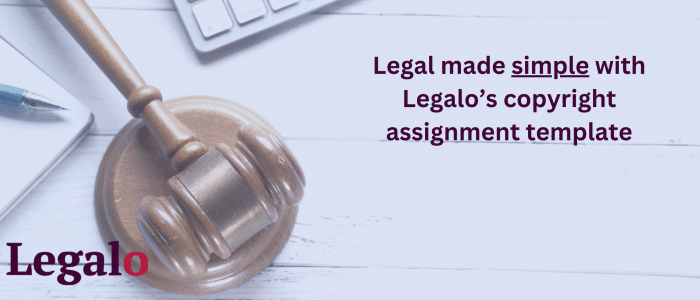
In the UK for copyright to be assigned from one party to another, it needs to be completed via an ‘ instrument in writing ‘. Section 90 of the The Copyright, Designs and Patents Act 1988 requires this. The term ‘instrument in writing’ means a written document.
The legislation also makes it a legal requirement that the assignment is signed by the ‘assignor’, which is the party transferring the copyright.
This simply means that you need to put in place a written agreement to transfer the copyright legally. Hence using a Copyright Assignment agreement template.
The transfer agreement documents the terms on which the assignment has taken place. It is valid as a means of transferring copyright in the Uk and in any commonwealth country.
Please note that in the UK, and the commonwealth countries, there is no register of copyright. Unlike for example the register of patents in the UK which is held by the Intellectual Property Office .
As a result, the transfer document acts as proof that the assignor has assigned the copyright. It also details:
As copyright is not registered in the UK, you do not need to make any application to the Intellectual Property Office to register the assignment.
So to cover all of this and make it very easy for yourself, use Legalo’s Copyright Assignment to transfer copyright.
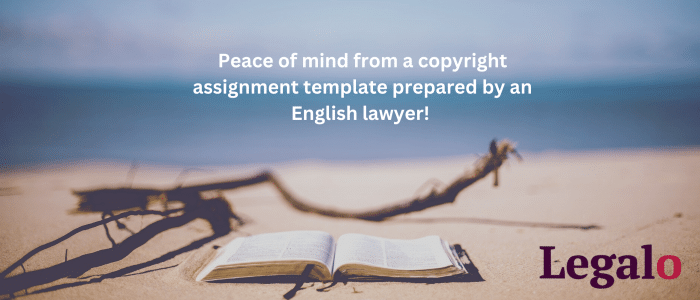
Once you have bought the agreement template, you can download it in Word format. You can then begin editing the document to create your custom copyright assignment agreement. It can then be converted to PDF format for signature if needed.
The template contains [square] brackets in several of the clauses which shows you where to edit the template. These clauses of the agreement should be edited with the information that is specific to your situation.
This will be details such as:
If the other party is paying for the transfer of the copyright, then add the amount within the agreement. However, if the owner (Assignor) is gifting the copyright, then you can edit the clause to confirm that the other party (Assignee) is not paying for it.
If you have any questions about the copyright assignment, please do contact us . We do also have other copyright templates if you need them:
All of our copyright related template documents have been drafted by one of our two inhouse practising UK English lawyers.
Unlike many other sellers of legal templates this assures your peace of mind. It also means you have expert advice on hand at no additional cost if needed.
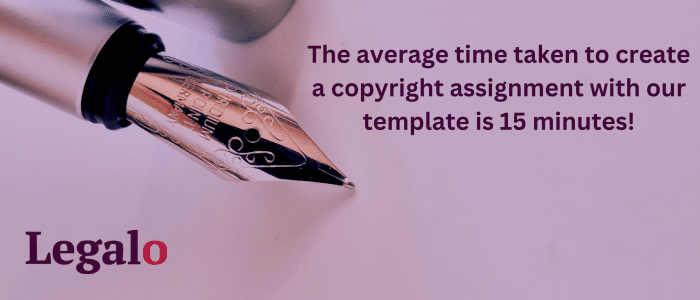
It is important not to confuse an assignment of copyright with a licence of copyright.
The key difference between an assignment and licensing of copyright is that an assignment is permanent. A licence is temporary and grants the licensee a right to use the copyright for the period of time set out in the licence.
The owner of copyright has the absolute right to exploit the copyright. This includes granting licences of the copyright to other parties.
You can read more about the distinction between copyright assignments and copyright licences on the World Intellectual property Organisation website.
Assigning copyright is not something that most people do regularly. Therefore it’s common to have questions. Below we set out the most common questions about copyright assignments from the Internet.
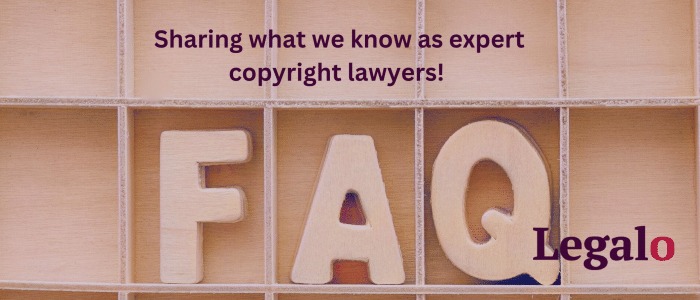
Copyright protects original creative works. For example, that could be a book, film, song or photograph.
Copyright gives the creator exclusive rights to control how their work is used and allows them to benefit financially from its use without the fear of others profiting from it.
For example, the creator has the legal right to publish, distribute and perform their work exclusively. They may earn money from those publications, performances or distribution of their work.
A common example of a copyrighted work is a piece of music, such as a pop song. The lyrics, melody, and arrangement of this song are all protected by copyright, meaning no one else can legally reproduce, distribute, perform, or create derivative works based on the original recording without permission from the copyright holder (for example, the songwriter or their estate).
In the UK, copyright protection over that work is automatic on production of the finished work.
In the UK, the law does not require registration of the work (nor is it possible) in order to gain copyright protection.
This may be different in other countries: some do permit registration of copyright; others do not even recognise copyright as a legal right or offer protection for it.
A copyright assignment is a legal process in which the owner of a copyright transfers some or all of their rights in a creative work to another party.
The process involves a written agreement stating the terms and conditions of the transfer, and what exactly the transfer involves. The agreement can also include details about the price or royalties due and any restrictions.
Once the assignment is complete, the original copyright owner no longer holds the transferred rights, and the assignee gains the ability to exercise those rights as if they were the original copyright owner.
As copyright in the UK is not registered, the assignment of copyright is not registered either.
You can assign copyright in the UK through a legally binding agreement in writing. The copyright owner must sign it.
It should clearly state what rights you are assigning, if there are any restrictions or conditions and if you require any payment for the copyright usage.
You must be sure that the parties have signed the document properly.
You can purchase a copyright assignment from Legalo, safe in the knowledge that we have made sure that it will be valid and cover what needs including under UK law.
If you wish to transfer, assign or sell the rights to use your copyright, then you would need to create a written agreement signed by you as the copyright owner.
This agreement is known as an assignment of copyright and should include any conditions or limits on the use of your copyright and if the person using the copyright has to pay you or do anything else in order to use the copyright.
It should be in writing and signed by both parties in order to meet the requirements of the Copyright, Designs and Patents Act 1988.
At Legalo, we have prepared this document as a template for you to use, so you know that we have included all the key clauses.
Yes, in the UK a copyright assignment must be a written document so it can be legally enforced.
Without a written document, you have no evidence of what you agreed or that you transferred or bought the rights. So you require a written document, so that it is clear, as we have discussed above:
It is important that the assignment includes the correct copyright assignment language. It is for that reason that we recommend using a template prepared by a UK lawyer.
As mentioned above, the law grants copyright automatically on the production of a unique, creative piece of work.
You can remind people of your copyright ownership by:
However, if you need to prove copyright ownership in a legal context, you can take certain steps to show clear ownership:
In the UK a copyright notice, to state that you are the copyright owner, must include the symbol ©, the year (or full date) the document or image was first published and the name of the copyright owner.
“All rights reserved” is a phrase that you can add if you would like. It would look something like this:

No, ownership refers to the holding of rights over an intellectual property asset, and determines who has the right to control and use the work.
On the other hand, assignment refers to the act of transferring the ownership rights to a new party and is a legally valid transfer of rights.
You can copy part of a work and not be in breach of copyright, so long as it is not a substantial portion of that work, The test for what is a “substantial” part is both a qualitative and quantitative test.
While copying a very small part of a larger written work is not going to be a breach of copyright, to avoid plagiarism, you should still acknowledge who wrote the words you are quoting.
In any event, you should give credit to the copyright owner. So state in writing that you have quoted from the author, stating their name, and that you do not claim ownership of the quoted words or intend any copyright breach.
For songs and music, generally you cannot copy any distinct part without permission and the payment of royalties. This includes the melody, lyrics, notes or chords and the rhythm.
In terms of sampling a music recording, you cannot do this at all without permission. There have been many legal cases over unauthorised sampling.
Our favourite one is where Sting, reportedly, gets paid US$2,000 a day by P Diddy for his unauthorised heavy sampling of Every Breath You Take in 1997. This is reportedly all of the profits from the unauthorised song . You can read more about this on the CNBC website .
No, registration is not possible at all in the UK to establish copyright. This is because the law automatically grants copyright protection to the creator upon the creation of an original work in a finished form.
However, posting a printed copy of your copyright material to yourself and leaving it in a sealed envelope with the Post Office’s date stamp on it can provide evidence of the date you created it and can therefore sometimes be helpful in legal disputes.
A copyright disclaimer is a statement that you can use to:
Here is an example:
“This work is protected by copyright. All rights reserved. No part of this work may be reproduced, distributed, or transmitted in any form or by any means, including photocopying, recording, or other electronic or mechanical methods, without the prior written permission of the copyright holder, except in the case of brief quotations embodied in critical reviews and certain other non-commercial uses permitted by copyright law.”
For further reading on copyright law we recommend this article on ‘How Copyright protects Your Work which is on the UK government website.
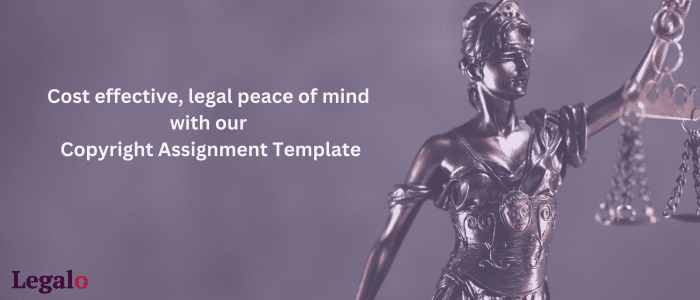
Our templates are all drafted by one of our two practicing UK solicitors.
An advantage of buying your assignment of copyright template from us here at Legalo is the fact that you can call our customer support telephone line, and speak to as solicitor, if you have any questions on this agreement template.
We are always on hand to help.